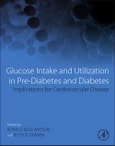This important reference, edited by Ronald Ross Watson and Betsy Dokken, collects the research needed to make the distinct connection between pre-diabetes, diabetes, and cardiovascular disease. Glucose Intake and Utilization in Pre-Diabetes and Diabetes: Implications for Cardiovascular Disease explains the mechanisms of progression from pre-diabetes to diabetes to cardiovascular disease. Since pre-diabetes and diabetes are important cardiovascular disease risk factors, and impaired glucose metabolism among cardiac patients is extremely prevalent, the importance of reviewing pre-diabetes and its involvement in CVD complications is vital as one applies food and glycemic control to slow progress to diabetes and heart disease. The book further focuses on glucose intake and utilization in diabetes, including coverage of diabetes in the development and pathology of cardiovascular disease, risks and epidemiology of cardiovascular problems promoted by diabetes, macrovascular effects and their safety in therapy of diabetics, beta cell biology and therapy of diabetes, and nutrition to modulate diabetes.
- Offers a complete review of cardiac health problems occurring with significant frequency in patients relative to their ability to regulate glucose
- Presents coverage of the role of glucose utilization, development of pre-diabetes and the ultimate development of various cardiovascular diseases
- Provides thorough dietary, nutrition, complementary and alternative botanical therapies for pre-diabetes and diabetes to halt the progression to cardiovascular disease
Table of Contents
1: Early origins of health and disease2: Diabetes and obesity: The impact of their coincidence on health and life
3: Diabetes: A new horizon and approach to management
4: Psychosocial Factors Associated with Diabetes Self-Management
5: The relationship between the organization of services for the treatment of type 2 diabetes and the risk of long-term complications
6: Effects of Bariatric surgery on co-morbid conditions associated with morbid obesity
7: Dietary and management of type 2 diabetes
8: Insulin Resistance and Inflammation, Links between Obesity and Cardiovascular Disease
9: Cardiovascular risk assessment in prediabetes: A hypothesis
10: Pre-diabetes, cardiovascular risk factors, arterial stiffness-ADMA
11: Effect of fiber and low glycemic load diet on blood glucose profile and cardiovascular risk factors in diabetes and poorly-controlled diabetic subjects
12: Glucose uptake and its consequence on cardiomyocyte function
13: Hypertension and Dyslipidemia in patients with prediabetes: dietary and other therapies?
14: Animal Models of Diabetic Cardiomyopathy
15: 4-Hydroxyisoleucine-Potential antidiabetic agent from Trigonella foenum graecum
16: mHealth Technologies in Pre-Diabetes and Diabetes Care
17: Fruit and glycemic control in type 2 diabetes
18: Antihyperglycemic activity of bioactive compounds from soybeans
19: Myoinositol supplementation on insulin resistance in gestational diabetes
20: The Tibetan herbal preparation Padma 28 (Padma basic) in treatment and prevention of diabetic complications and atherosclerosis
21: Cardiovascular Biomarker Assessment Across Glycemic Status
22: The transcultural diabetes nutritional algorithm (tDNA): from concept to implementation
23: Microcirculation: a key effector in insulin resistance
24: Glucose intake and utilization in pre-diabetes and diabetes: Tomato and diabetes
25: Optimal carbohydrate and nutrient intake for Japanese elderly patients with type 2 diabetes
26: Mediterranean diet for prevention of diabetes and cardiovascular disease and type 2 diabetes
27: Role of food and supplements in health of dialysis patients
28: Bioactive compounds increased incretins with beneficial effects on diabetes
29: Exercise and diet improve cardiometabolic risk in overweight and obese individuals without weight loss
30: Protein in the treatment of type 2 diabetes mellitus
31: Nutritional support in hospitalized patients with diabetes mellitus
32: Amino acids supplementation as nutritional therapy








